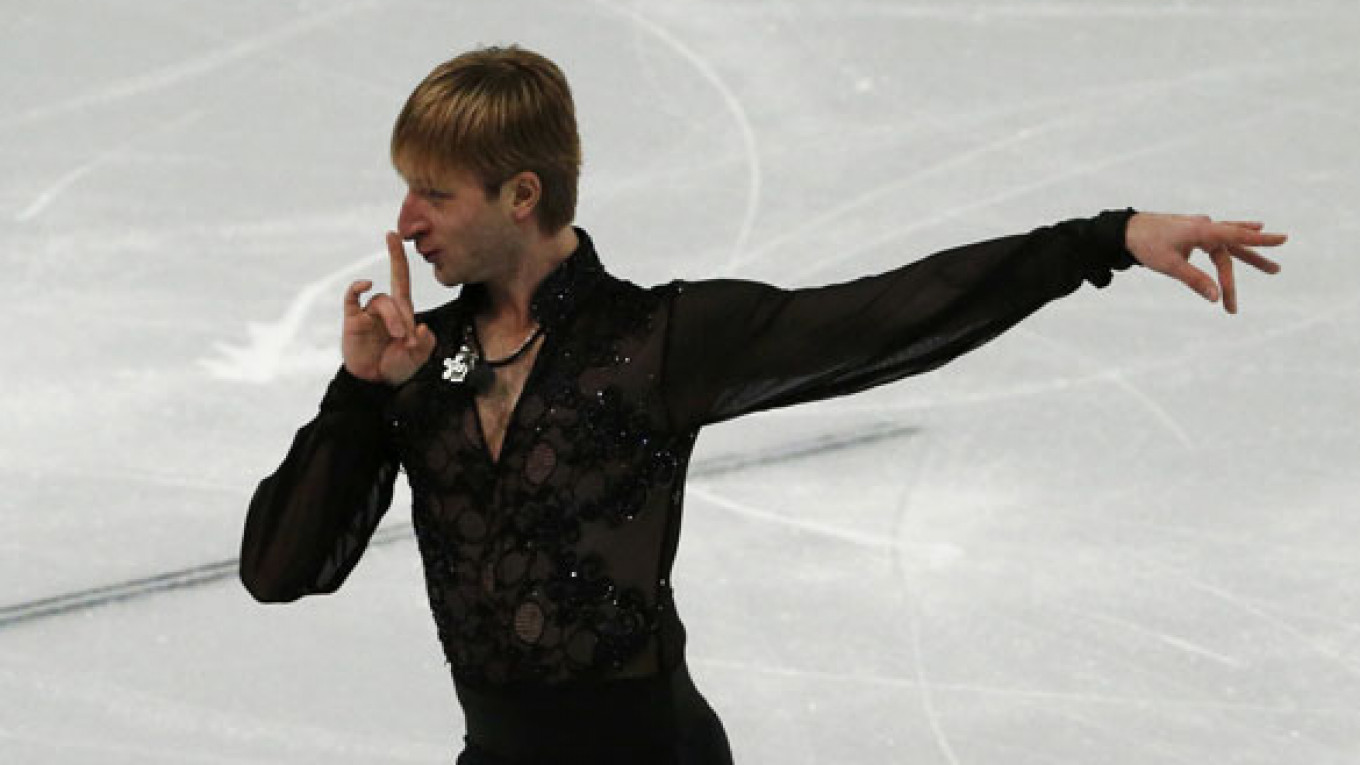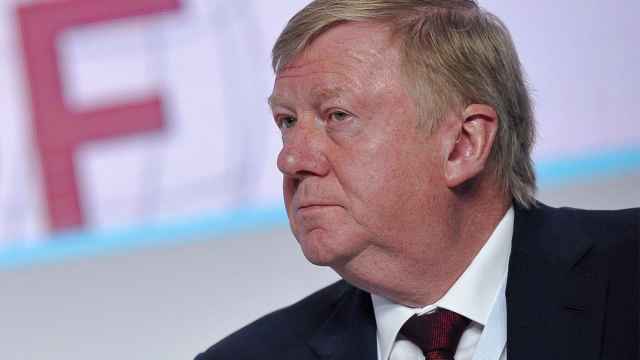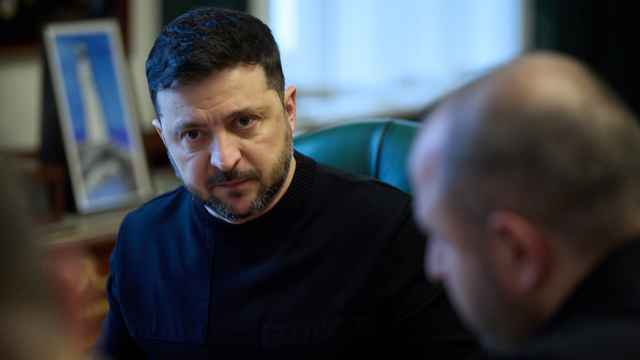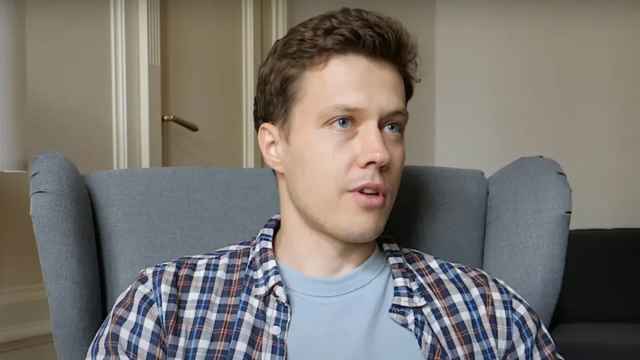Yevgeny Plushenko put Russia within touching distance of their first gold medal at the Sochi Olympics after the hosts opened up a seven-point lead in the inaugural team competition on Sunday. Plushenko was roared on to the ice, cheered throughout his free skate and then had the hollering crowd on their feet as he theatrically finished off his routine with a spin.
His score of 168.20 for a solid, if rather slow-paced, routine earned Russia 10 points to take their total to 57.
With two segments remaining, Russia and Canada (50 points) will battle it out for gold and silver, and the U.S. (41), Japan (38) and Italy (37) are all still in the running for the bronze.
Austrian Matthias Mayer conquered the treacherous Rosa Khutor run on Sunday to win the men's downhill, while the host nation was eyeing its first gold medal of the Games in the inaugural figure skating team event.
On the second day of full competition on Russia's Black Sea coast, Mayer claimed one of the Sochi Games' biggest titles, as pre-race favorites American Bode Miller and Norway's Aksel Lund Svindal failed to make the podium.
Son of 1988 super-G silver medallist Helmut, Mayer edged out Italy's Christof Innerhofer by 0.06 seconds on an overcast day in the Caucasus mountains.
"It is crazy. It is the greatest thing you can achieve as a sportsman — unbelievable," said the 23-year-old.
On the ice, Irene Wust of the Netherlands won the women's 3,000 meter Olympic crown, but the biggest roar went to Olga Graf who finished a surprise third to give the host nation its first medal.
Graf punched the air in delight upon realising her time but her expression turned to embarrassment soon after as she unzipped her suit to the waist before suddenly realizing and grabbing the zip edges to protect her modesty.
"I heard the crowd cheering for me and I did not expect such support from the audience," said the skater, before addressing her wardrobe malfunction.
"I totally forgot that I had nothing under my suit," she said, her steely focus disintegrating into a broad smile.
President Vladimir Putin congratulated his compatriot: "I am sure your success will boost the spirit of the Russian Olympians and give them added strength and confidence," he said.
Russia's best chance of gold on Sunday was in figure skating, after debutante Yulia Lipnitskaya, 15, blew away more illustrious rivals with her short skate on Saturday and put the hosts within striking distance of the Olympic team title.
Swiss cross-country skier Dario Cologna surged to surprise victory in the men's skiathlon and Jamie Anderson clinched the inaugural women's snowboarding slopestyle gold after compatriot Sage Kotsenburg matched the feat in the men's event on Saturday.
Jenny Jones claimed the bronze -- Britain's first Olympic medal in a snow event.
As well as international unease over the risk of violence, preparations for Russia's first ever Winter Games have been overshadowed by the outcry over recent legislation banning the promotion of gay propaganda among minors.
Russia believes the law is needed to protect minors, but activists say it fuels anti-gay violence.
Lesbian Austrian ski jumper and gay rights advocate Daniela Iraschko-Stolz said public reaction to the law had been exaggerated. The 30-year-old married her lesbian partner last year, a rare case of an Austrian athlete coming out as gay.
Asked whether she was worried about the law, Iraschko-Stolz replied: "No, on the contrary, I think everything is being blown up bigger than it is. I had a very good welcome like every other athlete: there were absolutely no problems."
Russian police detained gay rights activists who tried to protest on Moscow's Red Square and in St. Petersburg on Friday, shortly before the Games opened.
President Vladimir Putin praised the country's Olympic preparations, which have been marred by allegations of widespread corruption, as a major boost for the economy at times of crisis.
Putin has staked a great deal of personal and political prestige on the Games and hopes they will showcase Russia's modern face to the world and help its weakening economy.
"It is fully justified to say that the Olympic project, the Olympic construction work as a whole, was one of the most significant anti-crisis measure in the country," Putin said in comments to state television broadcaster, Rossiya 24, aired on Sunday.
He said about 300 firms from all around Russia were engaged in preparations for the Games — the first Winter Olympics ever to be held by Russia — and that the project has added 560,000 extra jobs.
His comments were part of the broadcaster's programme praising the preparations and the Games themselves as an exercise in national unity and a massive boost for Russian national pride two decades after the fall of the Soviet Union.
Many Russians yearn for the international clout enjoyed by the Soviet Union and feel there is too much criticism and not enough respect abroad for their homeland.
Allegations
But Kremlin critics say Putin has used the large-scale construction works in Sochi mainly to grant state contracts to his political allies and that corruption has been widespread.
The Games in Sochi, a Black Sea resort where Putin often spends his holidays, are also the most expensive Olympics ever with price tag of more than $50 billion.
Putin says there is no evidence of major corruption in Sochi but a recent survey by independent pollster Levada showed 47 percent of Russians believe the cost of the Games has soared because funds have been embezzled or mismanaged.
Security concerns as well as criticism from the West and rights groups over Russia's treatment of gays, environmental damage in Sochi and ill-treatment of migrant workers there have also clouded the run-up to the Games.
Ratings agency Moody's said the Games were unlikely to give the Russian economy a big boost.
In a blow to Putin, Moscow in November slashed long-term growth forecasts, acknowledging for the first time its economy would lag global growth over the next two decades and setting the stage for an era of stagnation. (Reuters)
A Message from The Moscow Times:
Dear readers,
We are facing unprecedented challenges. Russia's Prosecutor General's Office has designated The Moscow Times as an "undesirable" organization, criminalizing our work and putting our staff at risk of prosecution. This follows our earlier unjust labeling as a "foreign agent."
These actions are direct attempts to silence independent journalism in Russia. The authorities claim our work "discredits the decisions of the Russian leadership." We see things differently: we strive to provide accurate, unbiased reporting on Russia.
We, the journalists of The Moscow Times, refuse to be silenced. But to continue our work, we need your help.
Your support, no matter how small, makes a world of difference. If you can, please support us monthly starting from just $2. It's quick to set up, and every contribution makes a significant impact.
By supporting The Moscow Times, you're defending open, independent journalism in the face of repression. Thank you for standing with us.
Remind me later.






